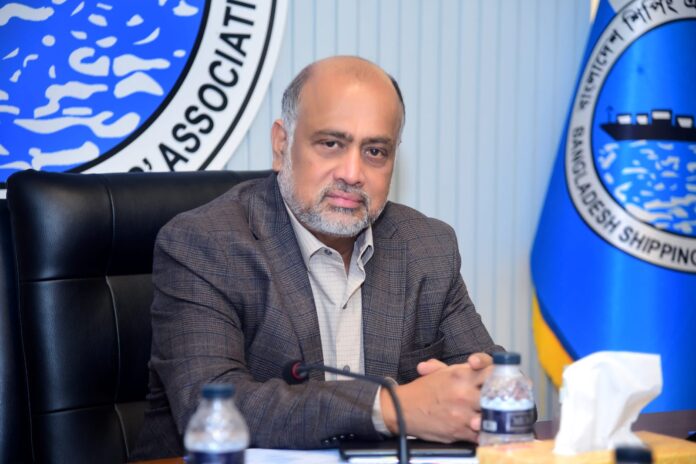In the following interview, Syed Mohammad Arif, Chairman of the Bangladesh Shipping Agents’ Association (BSAA), discussed the latest freight rate trends, the charter market, the impacts of Houthi attacks, and other critical issues in the shipping industry with Container News.
Question: How do you see the latest freight rate trends in the industry and what are your expectations/estimations for the container rates in the rest of the year?
Answer: Freight rates are linked to many factors. Just after the Covid-19 pandemic, container freight rates reached record-high levels. Towards the United States from Asia, the rates had shot up to US$20,000 per FEU while towards Europe it was US$16,000. Later, the rates came down to between US$3,500 and US$4,000. Nowadays the freight rates have increased to some extent as ships are sailing an additional two weeks due to the crisis in the Middle East. Ocean carriers’ cost of operation has increased significantly as the vessels ply additional miles to avoid possible attacks.
There is another impact of Houthi attacks on Asian ports. In the past, cargo from the Middle East had been shipped to its destination directly from the nearest ports. But now, to avoid the risks of being attacked, the cargo is transshipped through Asian hub ports, like Singapore and Colombo. As a result, due to the increased number of ships incoming, berthing delay in Singapore reached 4 to 5 days while in Colombo up to 3 days.
Thus, due to berthing delays and ship rerouting because of Houthi attacks, the number of trips of mother vessels has lessened causing a space shortage. The space crisis and congestion at regional hub ports have also impacted freight rates.
The ups and downs of freight rates during the rest of the year will largely depend on the Middle East security situation. Unless the Houthi attacks end and we hear about more countries joining in the Middle East war, and the unrest further escalates, the freight rates will continue to rise.
Q: What is your view on the charter market and how the latest Houthi attacks have impacted the industry?
A: The vessel charter market is up due to the Red Sea crisis. Due to the war, vessels are forced to ply additional days to reach their destinations creating a space shortage and the need for more and more ships. This has created pressure on the ship charter market and several operators are not getting required vessels. The situation may continue until the tension eases and the movement of ships through traditional routes returns.
Q: How is the congestion at the port of Singapore affecting the shipping industry and local exports-imports?
A: The current congestion in Singapore is almost four to five days. Due to Houthi attacks, vessels need to ply additional 15 days and the congestion eats up another four to five days totaling 20 days. The waiting time increase and additional days plying of ships have caused the mother space crisis. Moreover, the number of trips of feeder vessels also decreased due to congestion in Singapore impacting local imports and exports.
Q: How is the shortage of FEU containers affecting export shipments from Bangladesh and how the ship operators are handling this situation?
A: It is true that there is a dearth of forty-foot containers in Bangladesh. The fact is that due to lower delivery of containers during the Eid-ul-Azha linked holidays, when factories remained closed for nearly two weeks, an artificial crisis of FEU containers has been created. Moreover, due to the announcement of the fiscal budget in June, many importers did not take delivery of goods thus many containers became stuck in the Chittagong port.
In Europe and America, we mainly export goods and do not import from there. Thus big ship liners, which faced equipment shortages, for example, Hapag Lloyd, MSC, and ONE had shortages. But, in the meantime, they have overcome the situation.
As Eid is over and the budget has already been passed, we believe the equipment shortage will ease soon. Operators, who faced shortages, are bringing empty containers in increased volume to meet the needs.
A direct interchange of containers between the mainline operators can help lessen the equipment shortage. Also, they can meet the shortage of equipment through container swaps.
Q: How is the Flag Vessels Act causing problems for foreign ships in Bangladesh and what is the solution?
A: The Flag Protection Act has been causing big problems for foreign vessels plying in the Chittagong route. The Act should be made rational through amendment. You can not expect a good result by enforcing an Act forcefully.
There are 92 container vessels plying in the Chittagong route of which eight are local flag vessels which means their capacity is not more than 6%. But the Flag Vessel Act says they are entitled to carry 50% cargo which means other operators will mandatorily share half the cargo they collect with the local vessels. On the other hand, foreign vessels are not given certificate waivers in time thus they always suffer uncertainty and are forced to withdraw vessels from this route. Unless a foreign flag vessel can confirm that it will get permission to carry cargo on the next voyage from Bangladesh, it will not be able to continue business.
Our proposal is until local flag carriers attain adequate capacity, no restriction on foreign flag vessels should be given.
Sharar Nayel
Asia Correspondent







